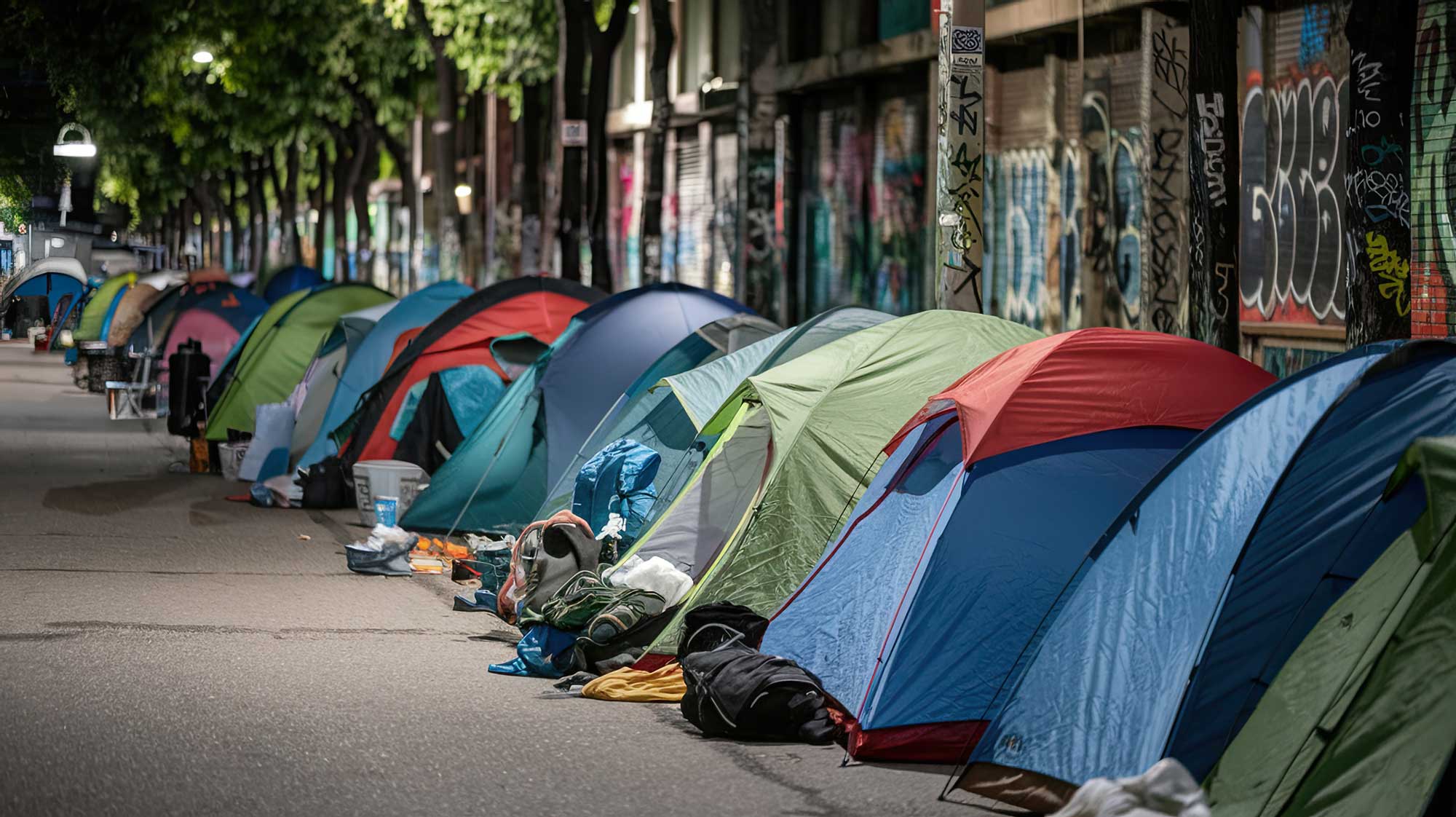
2025 Texas Homelessness Poll
Texans across political lines overwhelmingly perceive homelessness as a growing problem (68%), with strong concerns about encampments near schools and public areas. These concerns reflect a broader shift: voters increasingly link homelessness with public safety and urban disorder, not just poverty or housing costs. This aligns with a national trend—particularly among center-right and independent voters—toward enforcement-based approaches over permissive or purely service-based models.
KEY FINDINGS:
Public Concern Is High and Bipartisan
A strong majority (64%), including 58% of Democrats, are very concerned about encampments near elementary schools. Concern is high even in politically diverse regions, with 72% of all voters saying major cities should be doing more to address homelessness.
Homelessness Seen as a Public Safety Issue
Nearly half of all voters view encampments as a moderate or significant threat to safety, with 81% of GOP voters and over 70% of independents sharing that view.
Behavior Is Changing
52% say they’re very likely to avoid gas stations with aggressive panhandlers. Nearly half would avoid parks or even sending their child to a college near encampments. Public space avoidance is now a mainstream response to street disorder.
Support for Accountability and Enforcement
Texans favor practical solutions that reinforce order. A strong majority support:
- Enhanced drug penalties near shelters (57%)
- Easier eviction of squatters (79%)
- Business tax rebates for security (64%)
- Holding local officials legally accountable for failing to enforce the law (71%)
Homelessness in Texas has visibly increased in urban centers since 2018, especially in cities like Austin, where decriminalization policies briefly took hold before being reversed under public pressure. Governor Greg Abbott has taken a firm stance—deploying state resources to clear dangerous encampments, opposing policies that legalize public camping, and advancing models that tie shelter to services like job training and recovery. This reflects a growing appetite for policies that combine compassion with accountability.
At the federal level, the Trump administration’s HUD emphasized “housing results, not process,” and took steps to discourage the expansion of encampments while encouraging cities to show measurable outcomes. The public support for enforcement reflected in this poll mirrors that policy posture.
Bottom Line
Texans are ready for a reset. The data reflects growing fatigue with permissive homelessness policies and rising demand for order, safety, and results-driven governance. Governor Abbott’s enforcement-first, service-connected model is in step with the public mood: voters want to see action—compassion that includes consequences.
Crucially, inaction is not neutral. Encampments near schools, parks, and businesses discourage foot traffic, reduce consumer confidence, and drive up costs for small businesses. Voters understand that public disorder undermines not only safety but the long-term health of Texas’s economy. Successful reforms will strike the right balance—restoring public safety while offering structured, results-based pathways out of chronic homelessness. Texans want visible leadership, measurable outcomes, and safe streets for all.
POLL RESULTS
1. Across Texas, do you think homelessness is increasing, decreasing, or staying about the same?

2. How concerned are you that there are homeless encampments along the sidewalks where many college students walk to class?

3. How concerned are you that there are homeless encampments along the sidewalks where many elementary school students walk to class?

4. How much of a public safety threat do homeless encampments pose?

5. How likely are you to avoid shopping at a gas station or convenience store where there are aggressive panhandlers?

6. How likely are you to avoid a city park where there are homeless encampments?

7. How likely would you be to avoid sending your child to a college in an area where there are a significant number of homeless encampments?

8. Would you support or oppose enhanced criminal penalties for dealing drugs near facilities that provide charity services to homeless individuals?

9. Do you think big Texas cities like Austin, Dallas, and Houston do a good,
fair, or poor job of policing areas where there are large concentrations of homeless people?

10. Do you think big cities like Austin, Dallas, and Houston are doing enough
to solve their homelessness crisis?

11. Do you think local prosecutors across Texas are doing a good, fair, or
poor job of going after violent criminals?

12. Do you think local prosecutors should be held legally accountable if they choose not to prosecute a crime for political reasons?

13. Do you think police departments are receiving enough support to keep communities safe?

14. Do you think local elected officials should be held legally accountable
when they fail to enforce laws on theft and vandalism?

15. Should property owners be able to get a partial tax rebate if their city
fails to address crime in their area?

16. Would you support allowing businesses in high-crime areas to claim a
partial tax rebate to purchase security equipment?

17. Would you support making it easier for property owners to evict squatters from their buildings?


Results for this poll were collected using a sampling frame that gathered responses from 1,312 likely Texas voters during live calls, SMS messages, online panels, and automated telephone interviews conducted by Cor Strategies, Inc.
The survey was conducted May 27–30, 2025. The margin of sampling error is ±2.71 percentage points. The margin of sampling error may be higher or lower for subgroups. Results presented may not always appear to total 100 percent due to rounding.
Data were post-stratified using weighted demographic information from the U.S. Census Bureau’s Current Population Survey Voting and Registration Supplement and the state election authorities.
Demographic information for actual voters in past elections was used to construct sample target weights.
Cicero Institute paid for all costs associated with this survey.

Stay Informed
Sign up to receive updates about our fight for policies at the state level that restore liberty through transparency and accountability in American governance.
